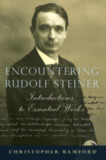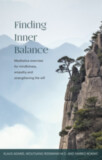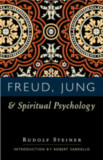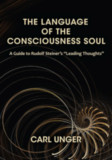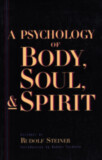Human and Cosmic Thought Edition 2 Revised
(CW 151)
Introduction by Robert A. McDermott
Translated by Charles Davy
Contributions by Frederick Amrine
- Publisher
Rudolf Steiner Press - Published
9th July - ISBN 9781855846647
- Language English
- Pages 152 pp.
- Size 6" x 9.25"
4 lectures, Berlin, January 20–23, 1914 (CW 151)
What convinces us of the truth of a point of view?
Why do we find it difficult to understand or accept differing perspectives?
What are the inner foundations of our knowledge?
In these concentrated, aphoristic lectures, Rudolf Steiner speaks of twelve main philosophical perspectives and the importance of comprehending each of them. Appreciating the variety of worldviews not only sharpens our thinking and makes it more flexible, but also helps us to overcome a narrow-minded one sidedness, promoting tolerance of others and their ideas and opinions. The future of philosophy rests not on defending one perspective and refuting all others, but in learning to experience the validity of all perspectives.
Steiner also explains how each philosophical standpoint is colored by a particular soul “mood” that influences the way we pursue knowledge as individuals. He describes the work of several thinkers in this way while shedding light on their unique contributions to human culture. Through such insights into the true nature of human thinking, we are led to understand the quality of cosmic thought, and how human beings are a thought that is thought by the hierarchies of the cosmos.
This revised translation features an introduction by Robert McDermott and editorial notes and appendices by Frederick Amrine, along with an index.
This volume is a translation from German of Der menschliche und der kosmische Gedanke, Rudolf Steiner Verlag; 2nd ed., 2014 (GA 151).
C O N T E N T S:
Introduction by Robert A. McDermott
1. Jan. 20, 1914: Crystallized concepts and concepts brought into movement as an advance from the realm of Spirits of Form to that of the Spirits of Movement
2. Jan. 21, 1914: On the possibility of contemplating the world from twelve different perspectives through twelve equally justified worldviews.
3. Jan. 22, 1914: Relations of the seven world worldviews, or moods (planets) to the twelve shades of worldviews (zodiac). The threefold tone in worldviews (Sun, Moon, Earth). The special case of anthropomorphism (Earth).
4. Jan 23, 1914: Humanity’s place in the spiritual cosmos from the perspective of spiritual astrology (astrosophy). Human beings as a thoughts of the hierarchies.Rudolf Steiner
Rudolf Steiner (b. Rudolf Joseph Lorenz Steiner, 1861–1925) was born in the small village of Kraljevec, Austro-Hungarian Empire (now in Croatia), where he grew up. As a young man, he lived in Weimar and Berlin, where he became a well-published scientific, literary, and philosophical scholar, known especially for his work with Goethe’s scientific writings. Steiner termed his spiritual philosophy anthroposophy, meaning “wisdom of the human being.” As an exceptionally developed seer, he based his work on direct knowledge and perception of spiritual dimensions. He initiated a modern, universal “spiritual science” that is accessible to anyone willing to exercise clear and unbiased thinking. From his spiritual investigations, Steiner provided suggestions for the renewal of numerous activities, including education (general and for special needs), agriculture, medicine, economics, architecture, science, philosophy, Christianity, and the arts. There are currently thousands of schools, clinics, farms, and initiatives in other fields that involve practical work based on the principles Steiner developed. His many published works feature his research into the spiritual nature of human beings, the evolution of the world and humanity, and methods for personal development. He wrote some thirty books and delivered more than six thousand lectures throughout much of Europe. In 1924, Steiner founded the General Anthroposophical Society, which today has branches around the world.




